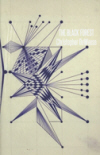The Black Forest
Christopher DeWeese’s The Black Forest is a book that falls into a family of highly imaginative, surreal, dream-like poetry collections that seem to be especially trendy lately. I’m certainly not complaining. Many of my favorite books of poetry fall into this family, like James Tate’s Return to the city of white donkeys and Zachary Schomburg’s The Man Suit.
Christopher DeWeese’s The Black Forest is a book that falls into a family of highly imaginative, surreal, dream-like poetry collections that seem to be especially trendy lately. I’m certainly not complaining. Many of my favorite books of poetry fall into this family, like James Tate’s Return to the city of white donkeys and Zachary Schomburg’s The Man Suit.
It’s hard then not to compare DeWeese’s work to these writers, especially since a) The Black Forest is published by Schomburg’s own press, Octopus Books, and b) James Tate has blurbed the collection, saying, “These poems sock home truth and enact poetic somersaults that leave me out of breath.”
The work collected in The Black Forest is worthy of those comparisons. It’s not necessarily a book you can just open up and quickly make sense of, though I’m not sure you’re supposed to. In fact, as I read it, I wondered how much a reader is supposed to make much sense of at all. Describing it as dreamy or surreal or imaginative would be fair, except for the moments when it surprisingly becomes thoughtful and pensive. It is a collection full of twists and turns and leaps of logic. Some are exciting and profound, while others are a bit confusing—maybe intentionally.
The book is broken into three sections, “The Forest Fire,” “The Hidden Fire,” and “The Black Fire,” and I’d hoped for a natural progression through what seemed like a progressive metaphor. I did a little research and read an interview with Deweese, who says, “I wanted to make the book grow more interior as it progressed; for the nature of the reality the poems inhabit to cast longer shadows,” but I’m not so sure this is the case.
In any event, the lack of cohesion between the poems in each section doesn’t take away from the fact that there are quite a few imagistic gems in the collection. My personal favorite is “Poem for Secretary’s Day,” which begins:
Secretaries, today is your day
and all the phones are missing.
We lashed the desks together
and we’re turning on the faucets
and watching Waterworld
and ordering a pizza.
The collection is filled with boisterous proclamations such as these, like in “The Wizard,” which starts: “Where is my wand? / The snow is getting thick / and I want a dome to live in.” Or “Folksong,” which begs: “Tusk, don’t leave me withered / Spring, butter my skin.”
The book is not without its mournful, pensive moments. While some of those reach a bit, there are small moments where DeWeese seems to get right to the heart of the matter, as in this untitled piece:
Like a court-appointed mourner,
I sent plastic flowers
to the discount cemetery.
I found a pit over my heart, Arthur,
and I jumped mumbles
like important prayers,
birds when I imagined the distance
between who we used to be
and the voice I heard
Overall the collection is fun to read. It’s interesting. It’s punchy. Though I have to say, I’m still not entirely sure what all it means. If I had to come up with an analogy, I’d say it is what Twisted Sister is to Bob Dylan. It’s awesome, and I want to jump around to it, but what’s at the heart of it, I’m not sure.





